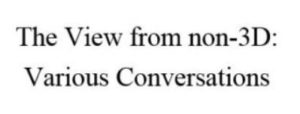
[From a Facebook argument.]
2013-07-23
[I omit his name] Frank: Give me some examples of irrationality relating to Atheism and science. Compared to religious myths science and Atheism are quantum leaps ahead in rationality.
Frank DeMarco I will put this as gently as i can. It is not exactly rational to disregard thousands of years of human cultures throughout the world, and the informed scientifically and clinically based experiences of great intellects such as Carl Jung, Immanuel Swedenborg, Rudolf Steiner, Goethe, and hundreds of others who could be cited, just because your mental construct of religion is compounded of televangelists, bible-thumpers, bent clerics and anything else disreputable (but nothing reputable) that you come across. It is not exactly rational to dismiss the concept of the nonphysical world and an inherent order in it, and an inherent interaction with the physical world, just because some people have outdated cartoonish ideas. Just because some people think of an old man on a cloud when they hear the word God does not mean that they are the final word on the subject.
So much for irrationality in atheism. As to irrationality in science (not to mention the corruption that came with money and power provided through the state), one hardly need go farther than to see the irrational reactions provoked among physicalists when anyone suggests that this creation didn’t just come into being by accident (“over millions of years,” to be sure!) Would you think it rational if someone refused to investigate the possibility that a 747 came into being other than via a tornado blowing through a junk yard?

